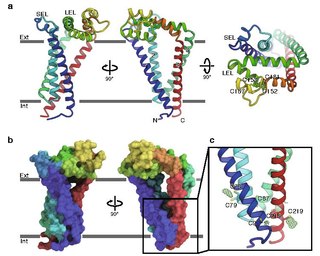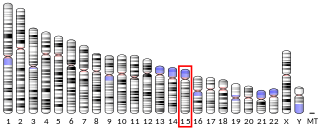
CD9 is a gene encoding a protein that is a member of the transmembrane 4 superfamily also known as the tetraspanin family. It is a cell surface glycoprotein that consists of four transmembrane regions and has two extracellular loops that contain disulfide bonds which are conserved throughout the tetraspanin family. Also containing distinct palmitoylation sites that allows CD9 to interact with lipids and other proteins.

Leukocyte antigen CD37 is a protein that in humans is encoded by the CD37 gene.

Leukocyte surface antigen CD53 is a protein that in humans is encoded by the CD53 gene.

CD63 antigen is a protein that, in humans, is encoded by the CD63 gene. CD63 is mainly associated with membranes of intracellular vesicles, although cell surface expression may be induced.

CD151 molecule, also known as CD151, is a human gene.

CD81 molecule, also known as CD81, is a protein which in humans is encoded by the CD81 gene. It is also known as 26 kDa cell surface protein, TAPA-1, and Tetraspanin-28 (Tspan-28).

CD82, or KAI1, is a human protein encoded by the CD82 gene.

Peripherin-2 is a protein, that in humans is encoded by the PRPH2 gene. Peripherin-2 is found in the rod and cone cells of the retina of the eye. Defects in this protein result in one form of retinitis pigmentosa, an incurable blindness.

Sodium- and chloride-dependent creatine transporter 1 is a protein that in humans is encoded by the SLC6A8 gene.

Uroplakin-1b (UP1b), is a protein which in humans is encoded by the UPK1B gene.

Uroplakin-1a (UP1a) is a protein that in humans is encoded by the UPK1A gene.

Tetraspanin-13 is a protein that in humans is encoded by the TSPAN13 gene.

Tetraspanin-4 is a protein that in humans is encoded by the TSPAN4 gene.

Tetraspanin-31 is a protein that in humans is encoded by the TSPAN31 gene.

Tetraspanin-8 is a protein that in humans is encoded by the TSPAN8 gene.

Tetraspanin-6 is a protein that in humans is encoded by the TSPAN6 gene.

Tetraspanin-3 is a protein that in humans is encoded by the TSPAN3 gene.

Transmembrane 4 L6 family member 5 is a protein that in humans is encoded by the TM4SF5 gene.

Tetraspanin-2 is a protein that in humans is encoded by the TSPAN2 gene.

Tetraspanin-12 (Tspan-12) also known as tetraspan NET-2 (NET2) or transmembrane 4 superfamily member 12 (TM4SF12) is a tetraspanin protein that in humans is encoded by the TSPAN12 gene. Tetraspanin-12 is found in the membrane of a variety of cells. It has an unusually long C-terminal intracellular tail of approximately 60 amino acids.
















